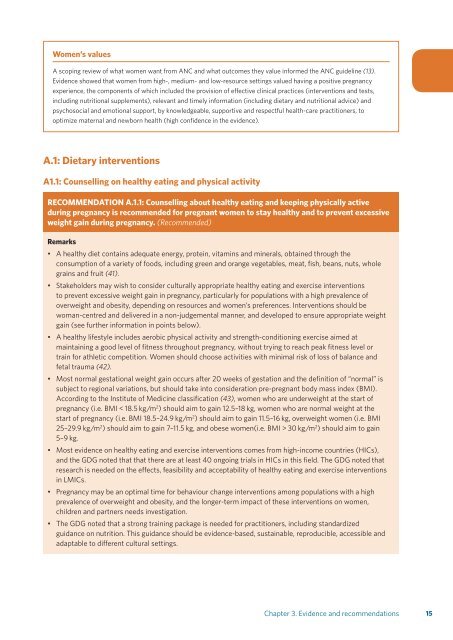WHO recommendations on antenatal care for a positive pregnancy experience
5pAUd5Zhw
5pAUd5Zhw
Create successful ePaper yourself
Turn your PDF publications into a flip-book with our unique Google optimized e-Paper software.
Women’s values<br />
A scoping review of what women want from ANC and what outcomes they value in<strong>for</strong>med the ANC guideline (13).<br />
Evidence showed that women from high-, medium- and low-resource settings valued having a <strong>positive</strong> <strong>pregnancy</strong><br />
<strong>experience</strong>, the comp<strong>on</strong>ents of which included the provisi<strong>on</strong> of effective clinical practices (interventi<strong>on</strong>s and tests,<br />
including nutriti<strong>on</strong>al supplements), relevant and timely in<strong>for</strong>mati<strong>on</strong> (including dietary and nutriti<strong>on</strong>al advice) and<br />
psychosocial and emoti<strong>on</strong>al support, by knowledgeable, supportive and respectful health-<strong>care</strong> practiti<strong>on</strong>ers, to<br />
optimize maternal and newborn health (high c<strong>on</strong>fidence in the evidence).<br />
A.1: Dietary interventi<strong>on</strong>s<br />
A1.1: Counselling <strong>on</strong> healthy eating and physical activity<br />
RECOMMENDATION A.1.1: Counselling about healthy eating and keeping physically active<br />
during <strong>pregnancy</strong> is recommended <strong>for</strong> pregnant women to stay healthy and to prevent excessive<br />
weight gain during <strong>pregnancy</strong>. (Recommended)<br />
Remarks<br />
• A healthy diet c<strong>on</strong>tains adequate energy, protein, vitamins and minerals, obtained through the<br />
c<strong>on</strong>sumpti<strong>on</strong> of a variety of foods, including green and orange vegetables, meat, fish, beans, nuts, whole<br />
grains and fruit (41).<br />
• Stakeholders may wish to c<strong>on</strong>sider culturally appropriate healthy eating and exercise interventi<strong>on</strong>s<br />
to prevent excessive weight gain in <strong>pregnancy</strong>, particularly <strong>for</strong> populati<strong>on</strong>s with a high prevalence of<br />
overweight and obesity, depending <strong>on</strong> resources and women’s preferences. Interventi<strong>on</strong>s should be<br />
woman-centred and delivered in a n<strong>on</strong>-judgemental manner, and developed to ensure appropriate weight<br />
gain (see further in<strong>for</strong>mati<strong>on</strong> in points below).<br />
• A healthy lifestyle includes aerobic physical activity and strength-c<strong>on</strong>diti<strong>on</strong>ing exercise aimed at<br />
maintaining a good level of fitness throughout <strong>pregnancy</strong>, without trying to reach peak fitness level or<br />
train <strong>for</strong> athletic competiti<strong>on</strong>. Women should choose activities with minimal risk of loss of balance and<br />
fetal trauma (42).<br />
• Most normal gestati<strong>on</strong>al weight gain occurs after 20 weeks of gestati<strong>on</strong> and the definiti<strong>on</strong> of “normal” is<br />
subject to regi<strong>on</strong>al variati<strong>on</strong>s, but should take into c<strong>on</strong>siderati<strong>on</strong> pre-pregnant body mass index (BMI).<br />
According to the Institute of Medicine classificati<strong>on</strong> (43), women who are underweight at the start of<br />
<strong>pregnancy</strong> (i.e. BMI < 18.5 kg/m 2 ) should aim to gain 12.5–18 kg, women who are normal weight at the<br />
start of <strong>pregnancy</strong> (i.e. BMI 18.5–24.9 kg/m 2 ) should aim to gain 11.5–16 kg, overweight women (i.e. BMI<br />
25–29.9 kg/m 2 ) should aim to gain 7–11.5 kg, and obese women(i.e. BMI > 30 kg/m 2 ) should aim to gain<br />
5–9 kg.<br />
• Most evidence <strong>on</strong> healthy eating and exercise interventi<strong>on</strong>s comes from high-income countries (HICs),<br />
and the GDG noted that that there are at least 40 <strong>on</strong>going trials in HICs in this field. The GDG noted that<br />
research is needed <strong>on</strong> the effects, feasibility and acceptability of healthy eating and exercise interventi<strong>on</strong>s<br />
in LMICs.<br />
• Pregnancy may be an optimal time <strong>for</strong> behaviour change interventi<strong>on</strong>s am<strong>on</strong>g populati<strong>on</strong>s with a high<br />
prevalence of overweight and obesity, and the l<strong>on</strong>ger-term impact of these interventi<strong>on</strong>s <strong>on</strong> women,<br />
children and partners needs investigati<strong>on</strong>.<br />
• The GDG noted that a str<strong>on</strong>g training package is needed <strong>for</strong> practiti<strong>on</strong>ers, including standardized<br />
guidance <strong>on</strong> nutriti<strong>on</strong>. This guidance should be evidence-based, sustainable, reproducible, accessible and<br />
adaptable to different cultural settings.<br />
Chapter 3. Evidence and <str<strong>on</strong>g>recommendati<strong>on</strong>s</str<strong>on</strong>g> 15


